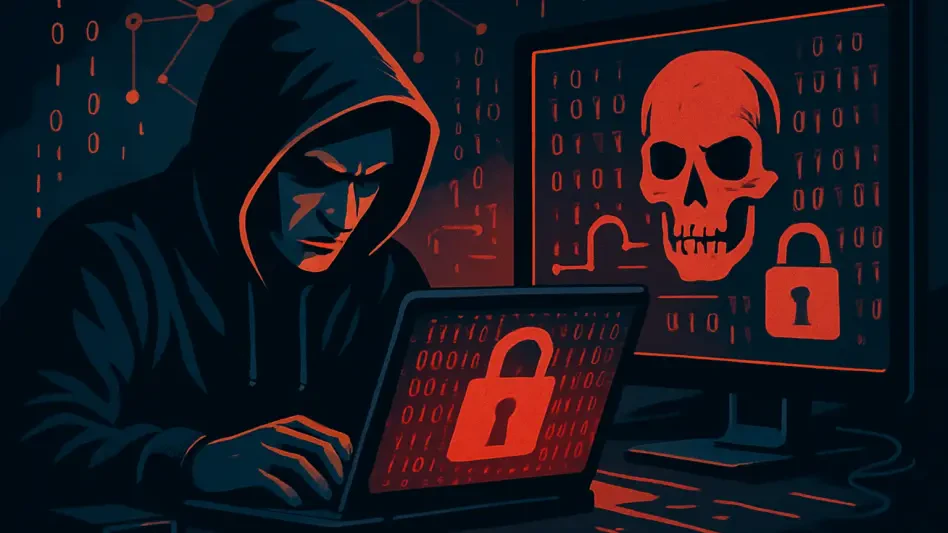In a stark reminder of the pervasive threat of cybercrime, a 43-year-old Ukrainian national, Oleksii Oleksiyovych Lytvynenko, finds himself at the center of a high-profile legal battle in the United States. Arrested in Ireland in July 2023 and subsequently extradited to a federal court in Tennessee, Lytvynenko has pleaded not guilty to serious charges, including computer fraud conspiracy and wire fraud conspiracy. These accusations tie him to the infamous Conti ransomware group, a cybercriminal organization responsible for extorting millions from victims worldwide. With a potential sentence of up to 25 years in prison looming, this case highlights the relentless pursuit of justice by international law enforcement and the ever-evolving danger posed by ransomware attacks. As digital threats continue to infiltrate critical systems globally, the proceedings against Lytvynenko serve as a critical juncture in the fight against such pervasive criminal enterprises, shedding light on both the tactics of these groups and the collaborative efforts to dismantle them.
Global Impact of Ransomware Threats
Devastating Reach of Conti’s Operations
The Conti ransomware group, with which Lytvynenko is allegedly associated, has left an indelible mark on global cybersecurity through its widespread and destructive campaigns. Targeting over 1,000 victims across 47 U.S. states, Washington, D.C., Puerto Rico, and 31 countries, the group has reportedly extorted more than $150 million in ransom payments, according to FBI estimates. Their method of operation involved infiltrating computer networks, encrypting sensitive data, and demanding hefty ransoms while threatening to leak stolen information if payments were not made. A particularly egregious example occurred in Tennessee, where two victims, including a government entity, were extorted for approximately $634,000 in Bitcoin in earlier years. This attack disrupted critical systems, including those of a sheriff’s department, local emergency medical services, and a police department, illustrating the profound real-world consequences of such cybercrimes on public safety and infrastructure.
Persistent Evolution of Cybercriminal Tactics
Even after Conti officially disbanded in 2022 following a major leak of internal communications, the threat did not dissipate but instead transformed into new forms. Former members rebranded under different names such as Zeon, Black Basta, Quantum (later Royal), and BlackSuit in more recent times, showcasing a troubling adaptability in the cybercrime landscape. This constant reinvention allows these groups to evade law enforcement and sustain their illicit operations, posing ongoing challenges to global security efforts. Historical attacks on critical infrastructure providers and even the Costa Rican government in 2022 further underscore Conti’s reach, prompting significant responses like a $10 million reward from the U.S. State Department for information on the group’s leaders. Such resilience among ransomware actors emphasizes the need for continuous innovation in cybersecurity defenses and international policies to counter these evolving threats effectively.
Legal Proceedings and International Collaboration
Details of Lytvynenko’s Alleged Involvement
Delving into the specifics of Lytvynenko’s case reveals a deeply entrenched role within Conti’s operations, as alleged by U.S. prosecutors. Until just before his arrest in July 2023, he is accused of actively participating in the group’s activities, including controlling stolen data from numerous victims and crafting ransom notes designed to intimidate and coerce. At the time of his apprehension in Cork, Ireland, where he had sought temporary protective status after leaving Ukraine in 2022, authorities discovered an open laptop running Cobalt Strike—a tool notorious for facilitating network intrusions—alongside chat applications discussing ongoing cyberattacks. This evidence suggests not only past involvement but continued engagement in malicious cyber activities even after Conti’s public disbandment. The severity of these actions, combined with the potential for a lengthy prison sentence, paints a picture of an individual deeply embedded in a sophisticated criminal network.
Unified Efforts Against Cybercrime Networks
The extradition of Lytvynenko from Ireland to the United States exemplifies the power of international collaboration in tackling the borderless nature of cybercrime. Strong partnerships with Irish law enforcement facilitated this process, reflecting a shared commitment to protecting citizens and businesses from ransomware threats. High-ranking officials, including representatives from the FBI’s Cyber Division and the Department of Justice, have reiterated a firm stance against such actors, emphasizing the urgency of these efforts. Additionally, the indictment of four alleged co-conspirators in the same Tennessee court in 2023 signals a broader strategy to dismantle networks tied to Conti. This collective resolve highlights a growing determination among global authorities to pursue and prosecute cybercriminals, regardless of their attempts to seek refuge in foreign jurisdictions or hide behind temporary legal statuses, ensuring that justice reaches even the most elusive perpetrators.
Broader Challenges in Combating Digital Threats
Beyond the specifics of this case, the broader landscape of cybercrime presents complex challenges that transcend individual prosecutions. Ransomware groups like Conti operate with increasing sophistication, often under the protection of foreign jurisdictions, making apprehension and conviction a difficult endeavor. The ability of these criminals to frequently relocate or exploit temporary statuses, as seen with Lytvynenko’s situation in Ireland, adds layers of difficulty to law enforcement efforts. Yet, this case also showcases an encouraging trend of persistence among global authorities, who are adapting to these challenges through enhanced cooperation and resource sharing. The ongoing evolution of cyber threats necessitates not only reactive measures but also proactive strategies, including bolstering cybersecurity infrastructure and fostering international agreements to address the systemic issues that allow such crimes to proliferate unchecked across borders.
Reflecting on a Persistent Battle
Looking back, the legal actions taken against Oleksii Oleksiyovych Lytvynenko mark a significant chapter in the ongoing struggle against ransomware threats that have plagued countless victims worldwide. His arrest and extradition stand as a testament to the tireless work of international law enforcement in holding cybercriminals accountable for their actions. Moving forward, the focus must shift toward strengthening global cybersecurity frameworks and fostering even deeper collaboration among nations to prevent such groups from reemerging under new guises. Investment in advanced threat detection technologies and public awareness campaigns can empower organizations and individuals to better safeguard their digital environments. Additionally, policymakers should prioritize creating robust legal mechanisms to swiftly address jurisdictional challenges, ensuring that no safe haven exists for those who exploit the digital realm for criminal gain. This case serves as a clarion call to remain vigilant and innovative in confronting an ever-shifting landscape of cyber threats.








